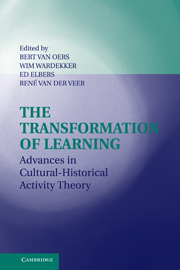Book contents
- Frontmatter
- Contents
- List of Contributors
- Preface
- INTRODUCTION
- SECTION ONE TENETS OF ACTIVITY THEORY
- SECTION TWO IDENTITY, DIVERSITY, AND INCLUSION
- SECTION THREE DYNAMICS OF ACTIVITY AND THE VARIATIONS OF LEARNING
- Introduction to Section Three: Learning in Social Settings: Challenges for Sociocultural and Activity Theory
- 15 Children's Learning through Participation in Institutional Practice: A Model from the Perspective of Cultural-Historical Psychology
- 16 Dialogue for Reasoning: Promoting Exploratory Talk and Problem Solving in the Primary Classroom
- 17 What Kinds of Tools and Resources Are Made Available to Students through Effective Guidance in a Student-Scientist Partnership Program?
- 18 Girls on the Sidelines: “Gendered” Development in Early Childhood Classrooms
- 19 Inscripting Predicates: Dealing with Meanings in Play
- 20 Pretend Play and Preschoolers
- Index
- References
17 - What Kinds of Tools and Resources Are Made Available to Students through Effective Guidance in a Student-Scientist Partnership Program?
Published online by Cambridge University Press: 25 August 2009
- Frontmatter
- Contents
- List of Contributors
- Preface
- INTRODUCTION
- SECTION ONE TENETS OF ACTIVITY THEORY
- SECTION TWO IDENTITY, DIVERSITY, AND INCLUSION
- SECTION THREE DYNAMICS OF ACTIVITY AND THE VARIATIONS OF LEARNING
- Introduction to Section Three: Learning in Social Settings: Challenges for Sociocultural and Activity Theory
- 15 Children's Learning through Participation in Institutional Practice: A Model from the Perspective of Cultural-Historical Psychology
- 16 Dialogue for Reasoning: Promoting Exploratory Talk and Problem Solving in the Primary Classroom
- 17 What Kinds of Tools and Resources Are Made Available to Students through Effective Guidance in a Student-Scientist Partnership Program?
- 18 Girls on the Sidelines: “Gendered” Development in Early Childhood Classrooms
- 19 Inscripting Predicates: Dealing with Meanings in Play
- 20 Pretend Play and Preschoolers
- Index
- References
Summary
Partnerships between scientists and students have a long history (John-Steiner, 2000; Pycior, Slack, & Abir-Am, 1996; Tinker, 1997). Typically, through joint activity over prolonged periods of time, old and new ways of thinking are being developed. Given the recognition that “generative ideas emerge from joint thinking, from significant conversations, and from sustained, shared struggles to achieve new insights by partners in thought” (John-Steiner, 2000, p. 3), such models of education also figure prominently in current reform-oriented educational efforts (e.g., Barab & Duffy, 2000; Brown, Collins, & Duguid, 1989; Collins, Brown, & Holum, 1991; Hennessy, 1993; Lave, 1996; Lave & Wenger, 1991; McGinn & Roth, 1999; Richmond & Kurth, 1999). Yet there is a paucity of research on how such ways of knowing and becoming are perceived by students and how they come to influence students' future endeavors.
A second area of concern centers on the low rates of participation of students from different ethnic, racial, cultural, and socioeconomic groups in science and mathematics disciplines, hereafter referred to collectively as underrepresented students. Much has been published on these disparities and the putative reasons behind them (Atwater, 2000; Mortensen, 1995; Oakes, Muir, & Joseph, 2000; Steele, 1997; Tobin, Seiler, & Walls, 1999). Against this backdrop are myriad programs that involve creative collaborations aimed at exposing underrepresented students to the cultures of science and mathematics in the hopes of encouraging these students to pursue careers in these disciplines.
Information
- Type
- Chapter
- Information
- The Transformation of LearningAdvances in Cultural-Historical Activity Theory, pp. 342 - 357Publisher: Cambridge University PressPrint publication year: 2008
References
Accessibility standard: Unknown
Why this information is here
This section outlines the accessibility features of this content - including support for screen readers, full keyboard navigation and high-contrast display options. This may not be relevant for you.Accessibility Information
- 1
- Cited by
